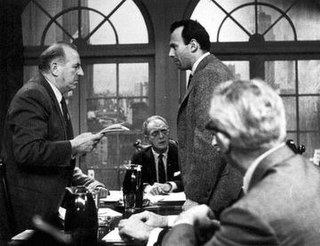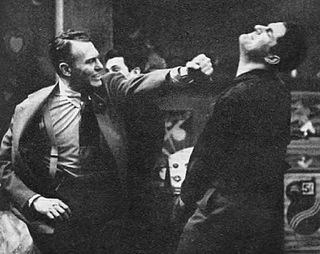
Jonathan Stephen Ross is an English broadcaster, film critic, comedian, actor, writer, and producer. He presented the BBC One chat show Friday Night with Jonathan Ross during the 2000s and early 2010s, hosted his own radio show on BBC Radio 2 from 1999 to 2010, and served as film critic and presenter of the Film programme.
The year 1957 in television involved some significant events. Below is a list of television-related events during 1957.
The year 1955 in television involved some significant events. Below is a list of television-related events during 1955.
The year 1954 in television involved some significant events. Below is a list of television-related events in 1954.
The year 1953 in television involved some significant events. Below is a list of television-related events during 1953.

Armstrong Circle Theatre is an American anthology drama television series which ran from June 6, 1950, to June 25, 1957, on NBC, and from October 2, 1957, to August 28, 1963, on CBS. It alternated weekly with The U.S. Steel Hour. It finished in the Nielsen ratings at number 19 for the 1950–1951 season and number 24 for 1951–1952. The principal sponsor was Armstrong World Industries.

Lux Video Theatre is an American television anthology series that was produced from 1950 until 1957. The series presented both comedy and drama in original teleplays, as well as abridged adaptations of films and plays.

Kraft Television Theatre is an American anthology drama television series running from 1947 to 1958. It began May 7, 1947 on NBC, airing at 7:30pm on Wednesday evenings until December of that year. It first promoted MacLaren's Imperial Cheese, which was advertised nowhere else. In January 1948, it moved to 9pm on Wednesdays, continuing in that timeslot until 1958. Initially produced by the J. Walter Thompson advertising agency, the live hour-long series offered television plays with new stories and new characters each week, in addition to adaptations of such classics as A Christmas Carol and Alice in Wonderland. The program was broadcast live from Studio 8-H at 30 Rockefeller Plaza, currently the home of Saturday Night Live.

My Little Margie is an American television situation comedy starring Gale Storm and Charles Farrell that alternated between CBS and NBC from 1952 to 1955. The series was created by Frank Fox and produced in Los Angeles, California, at Hal Roach Studios by Hal Roach Jr., and Roland D. Reed.
The following is the 1951–52 network television schedule for the four major English language commercial broadcast networks in the United States. The schedule covers primetime hours from September 1951 through March 1952. The schedule is followed by a list per network of returning series, new series, and series cancelled after the 1950–51 season. This was the first television season of national network interconnection by coaxial cable and microwave, meaning programming could be transmitted live coast-to-coast if needed.
Ford Theatre, spelled Ford Theater for the original radio version and known, in full, as The Ford Television Theatre for the TV version, is a radio and television anthology series broadcast in the United States in the 1940s and 1950s. At various times the television series appeared on all three major television networks, while the radio version was broadcast on two separate networks and on two separate coasts. Ford Theatre was named for its sponsor, the Ford Motor Company, which had an earlier success with its concert music series, The Ford Sunday Evening Hour (1934–42).

Man Against Crime starring Ralph Bellamy, one of the first television programs about private eyes, ran on CBS, the DuMont Television Network and NBC from October 7, 1949, to June 27, 1954, and was briefly revived, starring Frank Lovejoy, during 1956. The show was created by Lawrence Klee and was broadcast live until 1952. The series was one of the few television programs ever to have been simulcast on more than one network: the program aired on both NBC and DuMont during the 1953–54 television season.
The Eddy Arnold Show is the name of three similar American network television summer variety programs during the 1950s hosted by Eddy Arnold and featuring popular music stars of the day. It was also the name of a radio program starring Arnold.

Suspense is an American television anthology series that ran on CBS Television from 1949 to 1954. It was adapted from the radio program of the same name which ran from 1942 to 1962.
Rebound is an anthology television series which aired on both the ABC and on the DuMont networks. Featuring dramatic stories with unusual endings, the series ran from February 8, 1952, to May 30, 1952, on ABC and from November 21, 1952, to January 16, 1953, on DuMont. The ABC series aired Fridays from 9 to 9:30pm ET.
Steve Randall is an American detective television series starring Melvyn Douglas that ran on the DuMont Television Network from November 7, 1952, to January 30, 1953, and on CBS from June 16, 1953, to August 11, 1953.
Meet the Boss was an American series broadcast on the DuMont Television Network from June 10, 1952, to May 12, 1953. The series was hosted initially by Bill Cunningham. Marshall McNeil replaced Cunningham on October 7, 1952. Robert Sullivan also hosted the show.
Gulf Playhouse, also known as Gulf Playhouse: 1st Person and First Person Playhouse is an American anthology series that aired on Friday nights from 1952 to 1953 on NBC. Originally a standard live dramatic anthology series, it was later redeveloped as a summer replacement series whose anthology stories were now told as seen through the "eye" of the camera. The actors in each episode would talk to the camera as if it were a person, animal or object.
This Is Show Business is an American variety television program that was broadcast first on CBS and later on NBC beginning July 15, 1949, and ending September 11, 1956. It was CBS-TV's first regular series broadcast live from coast to coast. It was originally titled This Is Broadway.
Hollywood Opening Night is an American anthology television program that was broadcast on CBS in 1951-1952 and on NBC in 1952-1953. The NBC version was the first dramatic anthology presented live from the West Coast. Episodes were 30 minutes long.






